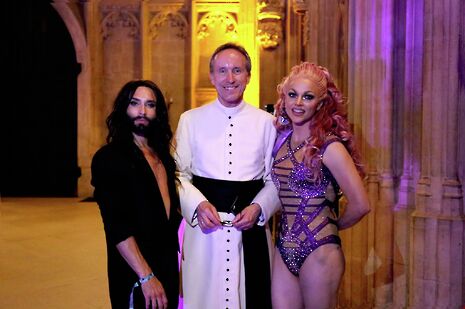Is that who you are? How beautiful
Reverend Andrew Hammond, Chaplain of King’s, argues that the Church must rethink its teaching in order to become a welcoming space for everyone

There have been some powerful pieces in Varsity recently on being an LGBT+ student here, and how that relates to Christianity. One was rather heartwarming, in that the writer had received significant affirmation from other Christians. But the experience of LGBT+ students here is not always so encouraging. I got an email the other day from a student saying – I’m gay, and I’m really interested in Christianity; but the Christians I’ve spoken to here say this is incompatible. It’s certainly not the first time someone has said this to me. I fixed to meet him, in the hope of rescuing the situation. Our conversation continues.
Many, many Christians – lay, ordained, young, old, ordinary, exalted – believe that the Church’s teaching on sexuality, marriage and gender identity all need to change. I’m one of them. This is about getting to grips with what Christian love really means. It means that the quality of the love between two people is what matters, not the gender of the lovers. It means that such love can be expressed between two people with integrity, because it is faithful to how people are made to love.
I believe that the Church is dynamic. So I don’t accept the idea that ‘church teaching’ is some immoveable, fixed body of doctrine. If it were, the Church would still support the death penalty (including drowning witches and burning at the stake), torture and slavery; and it wouldn’t have embraced equality for women, rejected racism, stopped demonizing suicide, accepted divorce and begun to question just war theory.
“I don’t accept the idea that ’church ‘teaching’ is some immovable, fixed body of doctrine”
The resistance to changing the teaching in the more vocal, visible parts of the Church is often alarmingly aggressive. Obsessive too. This is especially true in much of the white evangelical milieu in the US. Here in Cambridge you don’t encounter the vitriol and spitting rage, thankfully: I’ve yet to see a ‘God Hates Fags’ placard. But the determined resistance is still there. The best of this does try to be eirenic. Often though, the full affirmation of LGBT+ people – ie affirming their relationships and their selfhood – is anathema. I’ve seen it spill over into visible recoil.
The conservative line is that this is about sound biblical teaching. For some reason the idea of re-receiving the few verses that are said to be about homosexuality is not just rejected, but rejected vehemently. I find this, frankly, mystifying. After all, all those changes in the teaching which I mentioned earlier happened because of new understandings of what the Bible means. When it comes to detailed analysis, all the energy is to be found now in a sequence of studies by affirming evangelical scholars, mostly American. These are game-changers, and have contributed to the recent brave moves made by leading evangelicals in this country, such as the Bishop of Liverpool. And there are other, very different traditions of reading and receiving the Bible: centuries-old, rich, deep traditions. These are not always pithy, though, which means they attract less attention.
I just used the phrase ‘the few verses that are said to be about homosexuality’. Together with many, I believe that these texts are not ‘about homosexuality’ at all. They’re about things like pederasty, prostitution, rape and adultery. So they are texts that have nothing to say about relationships characterized by love, fidelity, honesty, kindness and so on. What is more, these few texts were articulated in a culture of total male supremacy, so for a man to be penetrated is to act like a woman: taboo. I fear that the more visceral the conservative resistance to change, the more likely this is to be about taboo, or prejudice. Or why would it be so angry?
If in doubt, go back to Jesus. When Jesus says you can judge prophets by their fruits (Matthew 7), what are the fruits we see? Anxiety, depression, self-harm, even suicide? Or love, generosity, loyalty, empathy and life-affirming joy? I think I know which prophets are onto something. You’ll find examples of that something in churches, chapels and individual Christians all over Cambridge: all ready to say, ‘Is that how you love? Is that who you are? How beautiful’.
 News / SU reluctantly registers controversial women’s soc18 December 2025
News / SU reluctantly registers controversial women’s soc18 December 2025 News / CUP announces funding scheme for under-represented academics19 December 2025
News / CUP announces funding scheme for under-represented academics19 December 2025 Features / Should I stay or should I go? Cambridge students and alumni reflect on how their memories stay with them15 December 2025
Features / Should I stay or should I go? Cambridge students and alumni reflect on how their memories stay with them15 December 2025 Fashion / The art of the formal outfit 18 December 2025
Fashion / The art of the formal outfit 18 December 2025 News / Dons warn PM about Vet School closure16 December 2025
News / Dons warn PM about Vet School closure16 December 2025










